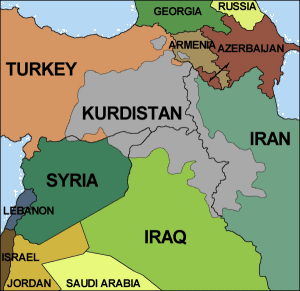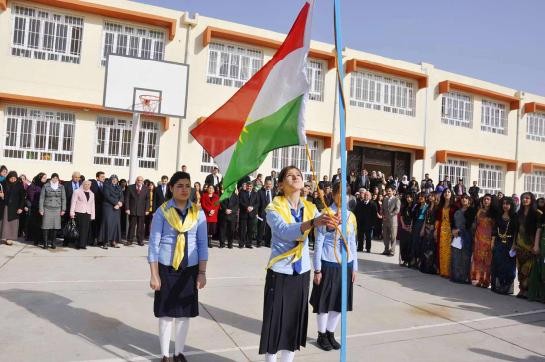At the moment everybody in Iraqi Kurdistan is looking at Syria, and remembering the difficult time in 1991, after Saddam was forced out of the Kurdish territories. There was no police, no army, no government. With the Syrian president Assad removing more and more soldiers from the Kurdish North-East of the country to fight in the main towns elsewhere, more and more territory is open for the Kurds to rule for themselves. But who is going to take over the security, who will govern?
Massoud Barzani knew this vacuum would happen in Syria, just like it did in Iraq. Partly for that reason, he brought the different Kurdish parties and groups from Syria together in Erbil. And some of these groups were not really friendly. In the past months there have been deadly clashes in Syria between the PKK-daughter PYD and other Kurdish groups. The latter work with the opposition Free Syrian Army towards a federal republiek, of which the Kurdish state would be part - like the situation in Iraq. But the PKK was taking over area's left by the Syrian army, without wanting to work with the other groups.The PKK-group has the support of about a third of the 2 million Syrian Kurds, and it is the most militant of the groups.
In Erbil, Barzani had a hard time convincing the groups and the PYD to work together and form a High Council that could fill the administrative vacuum. At the same time, he was working on the security vacuum. How to make sure thieves and thugs would not take over, or - as was happening - one of the Kurdish groups, which would lead to internal strife?
Since months, young Kurdish men were smuggled into Iraqi Kurdistan, most of them deserters from the Syrian army, others boys who ran away to stay out of the army. For a while, they were left on their own, until the Syrian Kurdish parties started pointing out how difficult their position was - without residency, no work, or underpaid work which could easily lead to criminal behavior - and asked the KRG to open up special camps for them.
I myself visited the Ministry of Peshmerga at the base just outside Sulaymaniya in March, and already then noticed that there were Syrian refugees in the waiting room. But reports about military training for the Syrian Kurdish youths were denied - until a video turned up on Youtube. It showed young Kurds in a dark uniform that reminds everybody here of the elite troops of the Barzani's. 'We go to Kamishlo, kaka', one of the guys is heard saying. Then president Barzani had to confirm the reports.
 Kamishli - the international name - is the main Kurdish town on the border from Syria and Turkey, one of the few places in the Kurdish region where fighting is going on with the Syrian army. Are these new recruits going to join in that battle? In the video they walk unarmed, and do not really show military behaviour. From Barzani's comment it appears that these guys are merely policemen that fill the vacuum that Assads police and army will leave.
Kamishli - the international name - is the main Kurdish town on the border from Syria and Turkey, one of the few places in the Kurdish region where fighting is going on with the Syrian army. Are these new recruits going to join in that battle? In the video they walk unarmed, and do not really show military behaviour. From Barzani's comment it appears that these guys are merely policemen that fill the vacuum that Assads police and army will leave.For most Kurds in Iraq, Barzani has done the right thing. Helping brothers based on the experience of the Iraqi Kurds. Turkey, KRG's main business partner, is giving off a double message. Surely this has been covered with Barzani, when they agreed on building an oil pipeline for the Kurdish oil. It seems very probable, that Erdogan asked Barzani to make sure the PKK would not take over Syrian Kurdistan, as that would gave them too good a base to work from towards doing the same in Turkey. By bringing the groups together and training young Kurds to police the place and not leave that to PKK, Barzani seems to have done the job.
Yet the official Turkish message is a different one. Ankara warns that it does not want a Kurdish state in Syria, and the Turkish minister of Foreign Affairs is coming to Erbil to stress this. Yet Ankara must know that this is a station that is passed: when Assad is gone, a new situation will make it possible for the Kurds in Syria to have their own rule, inside a federal republic, as most of the Kurdish groups are stressing. It seems that the harsh message is mainly meant for the PKK. Don't mess with Turkey, work with other groups, but do not think about taking the future of the Kurdish area in Syria in your own hands.
The question is also, how much influence the Iraqi Kurds can have on the situation in Syria. The process that has started, cannot really be stopped. How much can it still be sculptured to the Iraqi situation? And: who will be the Barzani and the Talabani of the Syrian Kurds? Or will Barzani be able to increase his status even further and play a role in Syria?
 Yet there is a bigger issue, that cannot have gone unnoticed in Erbil nor in Ankara. Since the Kurds had their own state inside Iraq, Kurds in the other three countries have wanted the same for themselves. If Syria is the next country where the Kurds can have their own rule, the eagerness amongst Kurds in Turkey and Iran will only grow. And so will the nationalism amongst the Kurds, and the drive towards a Greater Kurdistan. President Barzani has always been loyal to that dream - while his PUK opponent, the Iraqi president Talabani has spread the message that the dream of a Greater Kurdistan cannot come true because of the political situation outside Iraq. The Kurds have too many enemies, let's not provoke them, his message was.
Yet there is a bigger issue, that cannot have gone unnoticed in Erbil nor in Ankara. Since the Kurds had their own state inside Iraq, Kurds in the other three countries have wanted the same for themselves. If Syria is the next country where the Kurds can have their own rule, the eagerness amongst Kurds in Turkey and Iran will only grow. And so will the nationalism amongst the Kurds, and the drive towards a Greater Kurdistan. President Barzani has always been loyal to that dream - while his PUK opponent, the Iraqi president Talabani has spread the message that the dream of a Greater Kurdistan cannot come true because of the political situation outside Iraq. The Kurds have too many enemies, let's not provoke them, his message was. Barzani has by mentioning the dream time and again kept the fire burning. The developments in Syria will further feed the flames. Change is in the air. The dream seems suddenly not so impossible anymore.






